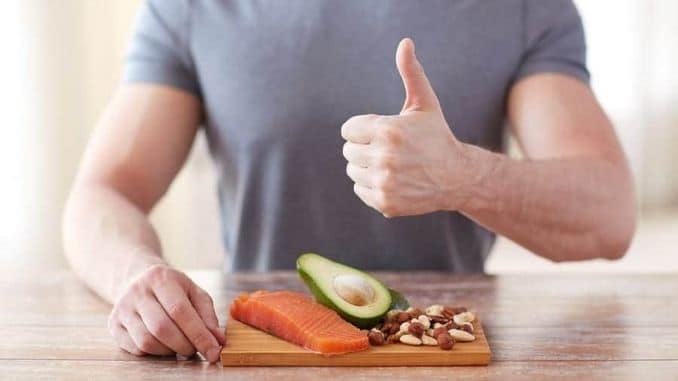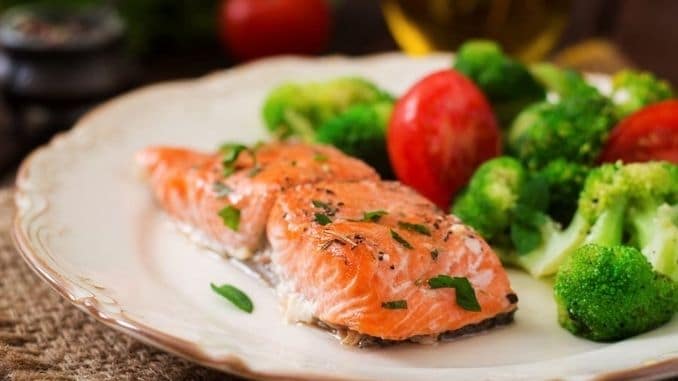
Eating healthy and getting plenty of exercise are important for everyone, right? Sure, but the nutritional needs of men are truly unique. Eating right means eating smart. This article will look at men specific nutritional issues that revolve around unique nutritional needs for optimal male health including protein requirements, prostate health, male fertility, and the heart. We’ll even talk about a disease that’s more common in women but can affect men too.

Protein for Muscle Mass and More
Overall, men have more muscle mass than women, so does that mean you should eat more red meat? While protein is certainly important, it depends a lot on your weight and level of exercise. Don’t forget that protein is critical for many other body processes beyond muscle building. Every organ in the body depends on protein for normal function. New cells require protein to be born, and many biological reactions are protein dependent.
If you’re not very active, the recommended daily amount of protein is about 0.8 grams of per kilogram of body weight, or 0.36 grams per pound. If you weigh 180 pounds, this is only about 65 grams or about 0.14 pounds. Doesn’t seem like much, right? But the grams of protein aren’t the same as how much the food itself weighs.
An 8-ounce steak weighs about 225 grams, but it only has 61 grams of actual protein. A large egg weighs 46 grams, but it only contains 6 grams of protein. So, if you are sedentary and weigh 180 pounds, one 8-ounce piece of beef satisfies your daily protein requirement.
Proteins are actually comprised of even smaller molecules called amino acids. Your body can produce some of these, but others must come from your diet. The ones required from food are called the essential amino acids.
Which Proteins Are Best?
If you eat plenty of red meat, chicken, fish, eggs and dairy products you probably get more protein than you need. Also, these animal-based products contain all the essential amino acids. Still, some sources of protein deliver added benefits for men. Here, we’ll mention two especially nutritious sources: salmon and egg whites.
Salmon Is Full of Nutritional Benefits
Unique Nutritional Needs for Optimal Male Health: Salmon is super-rich in protein and one of the best sources of omega-3 fatty acids. Omega-3s may help prevent cancers, heart disease and Alzheimer’s disease. Salmon’s rich omega-3 content also might facilitate weight loss, even when compared to other fish. So, fish is good for you, but salmon is great for you. Salmon also might be helpful in preventing metabolic syndrome, which can be a precursor to diabetes.
Salmon is packed with healthy vitamins such as B12, D, B3 and B6. It’s also rich in important minerals and elements like selenium and potassium.
The high protein and vitamin content of salmon make it one of the best foods to eat post-workout since your body craves nutrients within the first hour after exercise. This helps restore the protein broken down during your training session. The recommended serving size of salmon is 3 to 4 ounces for a fillet or steak.
Egg Whites for Winners
Egg whites are rich in branched chain amino acids. These make up 35 percent of the essential amino acids for your muscle proteins. Branched chain amino acids have been used for years by bodybuilders who want to minimize fat and build muscle. These nutrients may also help reduce fatigue. There is evidence showing that the branched chain amino acids may also prevent muscle breakdown.
You can eat up to five egg whites daily since they are low in calories and more than 90 percent protein. Avoid eating the yolks as they’re high in cholesterol.
Prostate Health
Prostate cancer is one of the most common cancers in men. One of the major risk factors for prostate cancer is obesity. As a general rule, any type of nutrition that leads to healthy weight maintenance may help reduce your risk for prostate cancer.
The Mediterranean diet is low in red meat and high in fresh fruits, vegetables, garlic, tomatoes, red wine, olive oil and fish. There is some evidence that this diet may reduce the incidence of prostate cancer and improve outcomes for those who already have prostate cancer. The research shows that foods containing lycopene and selenium probably protect against prostate cancer. Sun-dried tomatoes and avocados are especially high in lycopene. Brazil nuts, yellowfin tuna, halibut, and canned sardines are rich in selenium.
Some studies indicate that a diet high in calcium may stimulate prostate cancer growth. However, calcium is important for bone health and other body functions. If you’re thinking about limiting your calcium intake, it’s probably best to consult with a doctor or nutritionist first.
Here are some other dietary suggestions that may improve your prostate health:
- Cut back on fats and trans fats as animal fat, margarine and fried and baked foods may increase prostate cancer risk
- Consider taking a daily multivitamin especially one with B complex and folic acid
- Drink green tea
- Increase your intake of broccoli and cauliflower
- Avoid oils high in polyunsaturated fats such as corn, canola, or soybean; use olive oil instead
- Consider vitamin E, vitamin C and selenium supplements
Diet and Male Fertility
Male fertility is described in more ways than just the ability to procreate. The main factors to consider are sex drive (libido), erectile function, testosterone levels, sperm count and sperm mobility. Different nutritional factors can have a direct or indirect impact on all of these. Also, the effectiveness of different remedies depends on other variables.
One example is testosterone. If your levels are low, you might benefit from “Unique Nutritional Needs for Optimal Male Health” D-aspartic acid (D-AA). This amino acid is present in human semen and sperm cells, and several studies show that D-AA plays an important role in male fertility. One study revealed that by taking 3 grams of D-AA supplements a day, men’s testosterone levels increased significantly. Also for men with fertility problems, D-aspartic acid may improve the chances of pregnancy. D-AA appears to work by increasing the number and mobility of sperm cells.
Now, if your testosterone levels are normal or high already, D-AA might not work for you. In fact, it may even be detrimental. This could be because if you take the supplement, your body may detect this as having excess testosterone. Then, through a process called “negative feedback” your body’s own natural testosterone level may decrease.
Vitamin C, Vitamin D, Berries, Nuts and Veggies
Antioxidants are considered beneficial for overall health. For men, they might also be good for your reproductive health. Antioxidants prevent the cellular process of oxidation, which causes cell damage or destruction. Oxidative stress may lead to the development of many diseases including Alzheimer’s disease, Parkinson’s disease, diabetes | 404, rheumatoid arthritis, and some neurologic disorders. Oxidation has also been implicated in the development of some cancers.
Of course, anything that could prevent these problems is of interest to both men and women. However, this damaging process may also cause male infertility. That’s why it’s no surprise that Unique Nutritional Needs for Optimal Male Health, such as vitamin C, a powerful antioxidant, has been shown to help improve sperm motility and overall sperm count.
Other good sources of antioxidants are:
- Vitamin D
- Wild berries and blueberries
- Walnuts, Brazil nuts and pecans
- Green vegetables like broccoli and spinach
- Sweet potatoes
- Black beans, kidney beans and black-eyed peas
- Avocados
Osteoporosis in Men
You might be scratching your head thinking, “Isn’t this a woman’s disease?” In general, osteoporosis is much more common in women. However, by around the age of 65 years, men begin to lose bone mass at an equal rate as women. Another important fact is that osteoporosis may be caused by other influences that should be considered. This kind of disease is called secondary osteoporosis and can be caused by:
- Steroid medications which may be used to treat arthritis or inflammatory diseases
- Low testosterone levels which could be due to other medications, such as prostate cancer treatment
- Alcohol abuse and smoking
- Intestinal disease that prevents the absorption of calcium and vitamin D
Detecting and preventing osteoporosis at an early stage is critical. If not, the first sign of the disease might be a hip or spine fracture. There are a number of widely available tests that can measure bone density | 404. The best way to treat and prevent osteoporosis is with adequate calcium intake, vitamin D and weight bearing exercise.
Men’s Heart Health
Last, but certainly not least, is your cardiovascular health. Compared to women, men begin to have an increased heart attack risk at an earlier age. Starting at age 45, the male heart attack risk rate begins to rise.
Most people know that high cholesterol can further increase the risk. However, many don’t know that lots of foods can actually decrease your cholesterol, such as:
- Oats
- Barley and other whole grains
- Beans
- Eggplant and okra
- Almonds, walnuts and peanuts
- Canola, sunflower and safflower oils for cooking
- Apples, grapes, strawberries and citrus fruits
- Soy
- Fatty fish like salmon
Finally, foods to avoid that are high in cholesterol are:
- Red meat
- Whole-fat dairy products
- Eggs with yolk
- Palm oil, coconut oil and cocoa butter
- Trans fats, which are found in margarine, pastries and fried foods
Conclusion
For men, some specific nutrition guidelines can be useful. Good eating habits and regular exercise lead to a longer and healthier life. So, eat smart and live well.
If you are looking for ways on how to bring back your natural vitality while relieving chronic inflammation and boosting up the natural fat burning hormones of your body, then check out the Best Foods that Rapidly Slim & Heal in 7 Days program here, here! | 0



